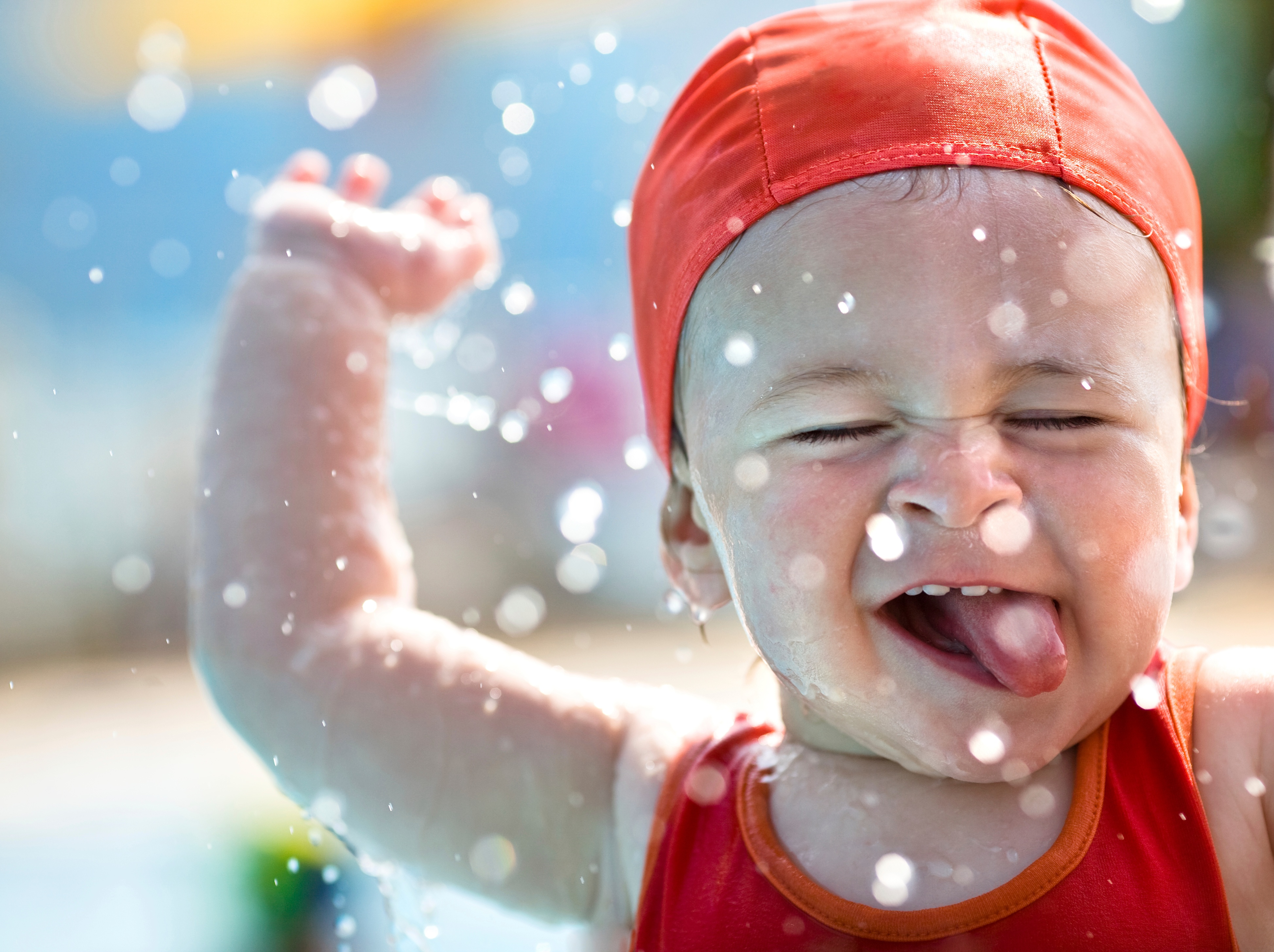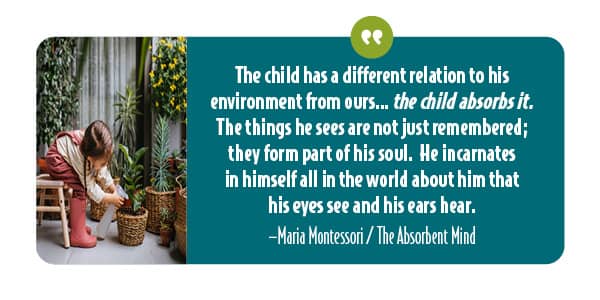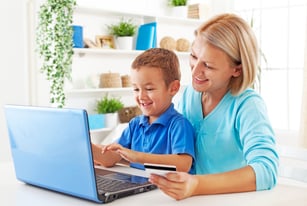Estimated reading time: 12 minutes

Table of Contents:
What Is Emotional Development?
Developing Self-Awareness and Emotional Regulation
Stages of Social-Emotional Development
Ages Birth to 6 Years
Toddler Emotional Development through Preschool
Key Actions for Parents of Children Birth through 6 years
Ages 7-12 Years
Key Actions for Parents of Children 7-12 Years Old
Ages 13-18 Years; Preteens and Teens
Dr. Michael Bradley, Quote from "Yes, Your Teen Is Crazy!"
Key Actions for Parents of Children 13-18 Years Old
Final Thoughts
What Is Emotional Development?
When referring to children's emotional development, it is the growing understanding of their emotional nature: how a child feels, recognizes, expresses, and regulates their emotions.
At birth, the newborn shows withdrawal from unpleasant sensations, such as being chilled or a shrieking noise and a natural inclination toward pleasant, comforting, and rewarding sensations, such as their mother rocking them.
During infancy, a vital exchange occurs between a baby and their caregiver. This mirroring and emotional dance is critical for the beginning of a child's emotional and social development. When this syncing is absent, it is distressing to the baby, which is illustrated in the Still Face Experiment.
As you can see, emotional development is not only complex; its architecture is constructed over many years and requires a multitude of experiences and interchanges.
Deep dive: "Piaget's Theory of Childhood Development."
Developing Self-Awareness and Emotional Regulation
Our job as parents is to help a child understand their constantly changing emotions. They must be able to identify what emotion they are feeling, express different emotions in healthy ways, and also be able to regulate their feelings to respect others. The regulation of emotions is fundamental to managing experiences and developing social-emotional intelligence.
Also, children need help juggling intense emotions within the paradox of a culture that values free expression yet also puts an emphasis on emotional restraint and social courtesies. Guiding a child and teen through the maze of emotions as they wax in self-awareness is a massive undertaking.
Another challenge is to teach your child self-control in a way that does not diminish their spirit or inhibit their unfolding personality. How do you enhance self-esteem and encourage autonomy and individuality while also teaching empathy toward others?
How do children learn how to feel a whole spectrum of emotions while managing and expressing them effectively?
Each stage of development is unique as are the child's needs at different ages. Let's look at this emotional unfoldment and the key parental actions to support and ensure healthy development during the different stages of social and emotional development.
Related reading: "37 Inspiring Ways to Raise an Emotionally Intelligent Child."
Stages of SOCIAL-emotional Development
 Ages Birth to 6 years old
Ages Birth to 6 years old
From birth to 18 months, infants are totally dependent and need a lot of love and nurturance. As an infant receives love and comfort from their parents, they grow in the ability to regulate their emotions and self-calm.
Parents' daily responses to their children are the building blocks of emotional literacy and secure attachment critical for healthy development.
As early as 3 to 6 months, infants are already showing signs of self-soothing as they suck on their fingers or turn away from unpleasant sounds. They move away from distress and seek comfort from caregivers.
The correlation is clear: infants learn to self-soothe by being consoled by caregivers. Research also suggests that it is the repeated and consistent responsiveness and warmth of a loving adult to an infant's cues that later assist the child in learning self-control and the development of empathy.

In Born to Love, the authors Maia Szalavitz and Bruce D. Perry, M.D., Ph.D. state how important a nurturing caregiver is.
"It is the attentive, attuned, and nurturing care of a baby's primary caregiver that begins to shape and regulate the developing stress response systems. The foundations of healthy self-regulation are developed during the first few years of parent/child interaction..."
Also, between 0-6 years is the emotional task of the child to develop trust and a sense of security. They are very sensitive when they perceive their safety is threatened. Seeking support from caregivers is prominent during these formative years.
The educator Maria Montessori considered the 0-6 ages the years of the "absorbent mind." This means that the child has no discriminatory abilities and absorbs the environment without censorship or discernment. With this immense sensitivity to everything around them, a parent's responses to the child are vitally important. They impact and imprint deeply on a child seeking safety, love, and guidance.
With this immense sensitivity to everything around them, a parent's responses to the child are vitally important. They impact and imprint deeply on a child seeking safety, love, and guidance.
In Martha Bronson's book, "Self-Regulation in Early Childhood" she states:
"Social interest and responsiveness appears to be innate in young children, but the social environment influences the way this interest and responsiveness develops."
In other words, as parents, it's our responsibility to provide a safe and loving environment to nurture this process in positive ways.
As an infant's awareness increases, they find pleasure and synchronicity in the expressions of others. These little ones are making efforts to connect with other people and objects, engaging in interactions with them.
They are extremely busy soaking up everything around them. Much of the child’s behavior during the first several years of life is developmental. A secure figure who provides stability to allow a child to securely attach yet who is also free to explore safely is vital for his or her growth.
Related reading: "The Mental, Emotional, and Social Health Benefits of Playtime with Your Kids."

Along with constant physical activity, children express emotions during these years freely and unencumbered.
Our job as parents is to accurately mirror emotions, teach children how to identify what emotion they are feeling, and then help them learn ways to express these emotions appropriately.
Five words will cover the emotions felt and expressed by children during this time: MAD, SAD, GLAD, HURT, and SCARED.
Toddler Emotional Development through Preschool Age
Toddlers experience more complex emotions and begin the development of language with an increasing awareness of their desires. They imitate and begin early impulse control. As a child waxes in greater independence, they also become more demonstrative.
There are apparent physical responses (eg., slower and softer or louder and faster voice and tone, open hands or clenched fists, relaxed or fast breathing, etc.); feelings that children recognize and name ("I feel sad because Mary took my toy."); thoughts about the feelings ("She was mean to take my toy!"); and finally action cues that signal coping responses of fight, flight or freeze (e.g., grabbing the toy back from the other child or crying and seeking comfort).
At the preschool age, there is an increasing ability for internal control of emotions and behavior while also asserting more independence. It's possible for preschoolers to execute their intentions as well as listen, follow instructions, and abide by rules and structure.
In preschool, children have more interest in interacting with other children and acquire an enhanced capacity for understanding others and expressing empathy. Growing in cooperation and emotional expression, they now have a full arsenal of language to assist them in self-expression and emotional restraint.
KEY ACTIONS for Parents of Children - Birth to 6 years:
- Give abundant love and attention
- Nurture lavishly
- Be highly responsive and fulfill the child's needs
- Accurately mirror the child's emotions
- Comfort consistently and lovingly when upset
- Provide loving and firm limits to garner self-control
Emotional-Social Development: Ages 7 to 12 Years Old
Between 7-12 years old, a child is completing a large part of their emotional growth. Many people think that the teen years are the most emotional, but the child has done most of their emotional maturation in the previous stages. By seven or eight, children are exploring the depth of their emotions and can become more sensitive about everything. In elementary years the child develops his sense that he is wanted, needed, and accepted.
 You might have a particular way you play with a child affectionately or something you playfully tease a child about when he or she is four, five, or six. After a child turns seven, maybe only days after, you can initiate the same play or teasing, and the child will storm off and say how much he hates it when you treat him that way. Suddenly everything is felt and expressed more intensely.
You might have a particular way you play with a child affectionately or something you playfully tease a child about when he or she is four, five, or six. After a child turns seven, maybe only days after, you can initiate the same play or teasing, and the child will storm off and say how much he hates it when you treat him that way. Suddenly everything is felt and expressed more intensely.
The good news is that as the logical brain continues to develop, children have a greater capacity to control their emotions and behavior. With increased experience comes a child's enhanced coordination of emotional modulation and social skills. Their social lives grow richer and more varied. With many social opportunities at school and through team sports and clubs along with family activities and adventures, social development accelerates during these years.
School-age children are beginning to identify the connections between events and how they feel as well as how they behave and why. They are also beginning to recognize how to cope with the increasing demands that accompany their growing maturity. They are curious and excited to learn so they frequently quiz adults about topics, especially ones that they are interested in.

During this stage, preferences and interests congeal, but they can also be more fickle and unpredictable. Patience, guidance, and opportunities for meaningful dialogue with the child help to round off skills and reinforce character values.
Peers begin to have greater influence, yet the parents' presence and attentiveness are crucial. Now is a time to support your child's activities, help them to know how to successfully break down overwhelming tasks, such as a big science project, and guide them to interpret their experiences in meaningful and helpful ways.
KEY ACTIONS for Parents of Children - Ages 7 to 12 years old:
- Be curious and ask questions to help the child draw helpful conclusions
- Encourage confidence-building activities
- Spend quality time with your child
- Help your child to calm and express emotions effectively
- Honor independence while staying connected and attentive
- Enforce loving and firm boundaries
Emotional-Social Development: Ages 13 to 18 years old
Adolescence brings a surge of independence and growing up. This developmental stage creates a natural pulling away from parents and an increased desire to be with peers and to seek their approval. Many times this stage can be scary for parents, especially because of a teenager's natural inclination for experimentation and risk-taking.
 Risk-taking is natural and increases at this time of a teen's brain development. They're not taking risks because they don't understand the dangers; they just weigh the risks differently than adults. Also, teens value the rewards of risk-taking more than mature adults. Their emotions intensify because of the cortical development completion as well as the influx of hormones. Loving yet firm parenting creates a grounding effect to help teenagers arrive at rational conclusions, such as driving and drinking having life-threatening consequences. This time is when setting healthy boundaries is critical.
Risk-taking is natural and increases at this time of a teen's brain development. They're not taking risks because they don't understand the dangers; they just weigh the risks differently than adults. Also, teens value the rewards of risk-taking more than mature adults. Their emotions intensify because of the cortical development completion as well as the influx of hormones. Loving yet firm parenting creates a grounding effect to help teenagers arrive at rational conclusions, such as driving and drinking having life-threatening consequences. This time is when setting healthy boundaries is critical.
As parents, our priority is always to keep our children safe no matter what age. The best way to ensure keeping your teen safe is by maintaining influence in their lives. When parenting teenagers, being a stable and responsive figure for their often emotional responses is critical for their developing brains.
This constancy and openness to their experience allow for opportunities to connect and discuss relevant topics. However, if parents react in knee-jerk ways too frequently, it is more likely that they will lessen the chance to impact their teen's choices or have a positive influence in their lives.
 It's crucial to stay connected with your teenager even though their peers and school activities propel them away from you. Continuing to make your relationship with your teen a high priority during these years is paramount. It is one of the most significant factors to lessen teenage rebellion.
It's crucial to stay connected with your teenager even though their peers and school activities propel them away from you. Continuing to make your relationship with your teen a high priority during these years is paramount. It is one of the most significant factors to lessen teenage rebellion.
Carve time for meaningful dialogue, which helps teens consider their behavior objectively and consider the positive and negative consequences of their choices.
During this period, tweens and teens are rapidly developing mentally. The lack of maturation of the teen brain accounts for the seeming contradictions in their behavior. They can be brilliantly intelligent, articulate, and capable during calm times but suddenly react and make illogical decisions in stressful times.
Staying connected with your teen and spending quality time together will assist in their brain development and continued emotional maturation. Your communication with your teen directly influences their developing mind and impacts brain development.
Dr. Michael Bradley, a leading adolescent psychologist, has this to say in his book, Yes, Your Teen Is Crazy!:
"The fact that her words or actions are crazy does not mean that the underlying thoughts and feelings have any less value to her than yours do to you. Listening means valuing your kids' thoughts and feelings as being important to her and thus important to you."
Bradley continues: "While it is true that 95 percent of the brain is developed by age five, the most advanced parts of the brain don't complete their development until adolescence is pretty much over." Young teens need a steady, healthy, and calm adult more than ever now.
And if you're asking "Is teenage rebellion normal?" know that the push-back you may feel from your teen is an important part of the maturing process. They are sorting and clarifying what's important to them and preparing to be on their own when they leave home.
KEY ACTIONS for Parents of Children - Ages 13 - 18 years old:
- Be curious without judging
- Allow choices; add conditions whenever necessary
- Help your teen regulate their emotions by providing a safe and solid presence
- Remain open and curious about your teen's experiences and ideas
- Take time to think about what you want to communicate before speaking
- Assess your teen's mood before broaching difficult conversations
- Provide positive and loving responses that strengthen the relationship
No matter what age, much of what children and teens learn about emotional intelligence and what comprises their "emotional workout" regimen is primarily made up of their interactions with their caregivers.
Through the responses of the adults around them, especially their parents, children and teens learn emotional regulation and how to interact appropriately with the world.
 One of your most important jobs as a parent is to help your child learn how to navigate the sea of emotions successfully. If we can be the lighthouse that is solid and unmoving, children learn to control themselves. Self-control is a skill that comes with a lot of experience and feedback. It is often lacking for children who lack emotional regulation.
One of your most important jobs as a parent is to help your child learn how to navigate the sea of emotions successfully. If we can be the lighthouse that is solid and unmoving, children learn to control themselves. Self-control is a skill that comes with a lot of experience and feedback. It is often lacking for children who lack emotional regulation.
Our children learn impulse control by how WE respond to their behavior and by how WE model self-control through our own behavior.
Kenneth Barish, Ph.D. states in the Huff Post: "A child’s increasing ability to “regulate” her emotions — to express her feelings in constructive rather than impulsive or hurtful ways — is now recognized as a critical factor in children’s psychological health."
Final Thoughts
By creating a stable and loving home, setting appropriate limits, and communicating clearly to our children, they are equipped to become responsible, loving, and free-thinking adults. Emotional intelligence isn't gained overnight but over many years of reinforcement and patience. Keeping the end in mind and your values close at hand is visionary parenting. As your child passes through the stages of emotional development, remember your love and patience count!
To develop visionary parenting, and help through parent coaching, contact us at support@heartmanity.com. For other parenting classes and resources, check out HeartPrint Parenting.

 Ages Birth to 6 years old
Ages Birth to 6 years old







